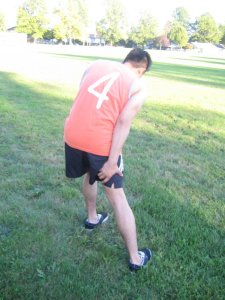Pain in the hip can be caused by arthritis of the hip joint, bursitis, muscle pull and tendonitis. Tendonitis involves the inflammation of the tendons. A tendon is part of the muscle that is made of fibrous connective tissue which is a strong band and function in attaching muscle to the bone as well as with muscle movement.
Hip tendonitis occurs when the tendons of hips are overused and there is stiffness and pain in the side of the upper leg.
Causes of hip tendonitis
- As the person ages, the tendons and muscle will lose their elasticity and susceptible to injury if they are flexible.
- People playing sports that requires kicking such as soccer and swimming. It requires quick upward and repeated movement of the legs.
- Activities such as dancing and basketball require changes of direction, twisting and turning at the joint of the hip can also cause straining of the tendons of the hip muscles.
- Sudden falling especially among dancers and gymnasts can cause stress to the hip tendons.
- Some medical conditions such as gout, diabetes and arthritis can cause inflammation in the hip joint and eventually hip tendonitis.

Symptoms
- The pain is severe especially in the morning and after waking up and minimized when resting and during sleeping at night because the legs are at rest.
- The hips are tender when touched due to the inflammation of the area and if left untreated, it will become worse and the pain is constant.
- The pain sometimes spreads down to the knee and there is stiffness of the joint of the hip.
- Reduced range of motion.
Treatment and home remedies
- Rest the affected hip for a few days or weeks and avoid doing activities that makes the symptoms worse.
- Take anti-inflammatory medications in order to help minimize inflammation of the tendons.
- Apply an ice pack on the affected area. Place a few ice cubes in a cloth and place it over the affected area for 10-15 minutes, every 3-4 hours. Apply the ice compress during the early stage of hip tendonitis to help with the healing and minimize pain quickly.
- After 1-2 days, apply a heating pad over the affected area since it helps in accelerating circulation and provides the needed nourishment to the inflamed tendon for healing.
- Massage the sore area using coconut oil since it helps lessen and relax the strained muscles.
- After a few days of rest, seek the help of a physical therapist to assist with exercises that are essential in strengthening the tone and flexibility of the muscles and tendon.
- With proper treatment, he/she can resume regular activities within 2-4 weeks.
With the help of these treatment measures, you can readily manage the symptoms of hip tendonitis. In case the condition persist, it is best to consult a doctor for proper assessment of the condition.
FACT CHECK
https://www.everydayhealth.com/hip-pain/tendinitis.aspx
https://physioworks.com.au/injuries-conditions-1/gluteal-tendinopathy
